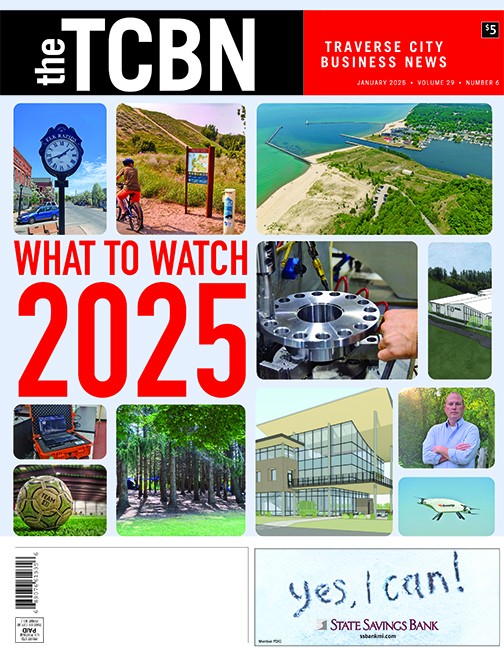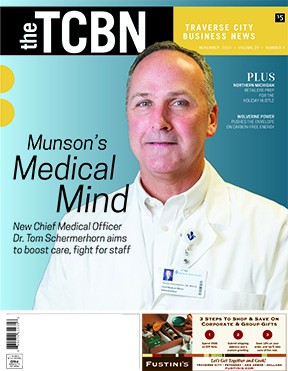What to Watch: What will make headlines in 2024
January 2024
It’s January and that means it’s time for the TCBN’s list of happenings in and around Traverse City as we head into the New Year. Here are previews of the people, products, places, and policies that business owners and influentials should be watching in 2024, ranging from the massive Grandview Parkway reconstruction to the plan to develop the region into a freshwater research epicenter to pending elections, and much more.
Grandview Parkway
Traverse City is no stranger to gridlock. In the past five years alone, summer traffic patterns in and around town have been disrupted by downtown bridge replacements, a complete revamp of Eighth Street, and intersection-to-roundabout conversions. In 2024, though, northern Michigan is staring down the barrel of what could be the biggest road project most local residents have ever seen: The reconstruction of Grandview Parkway.
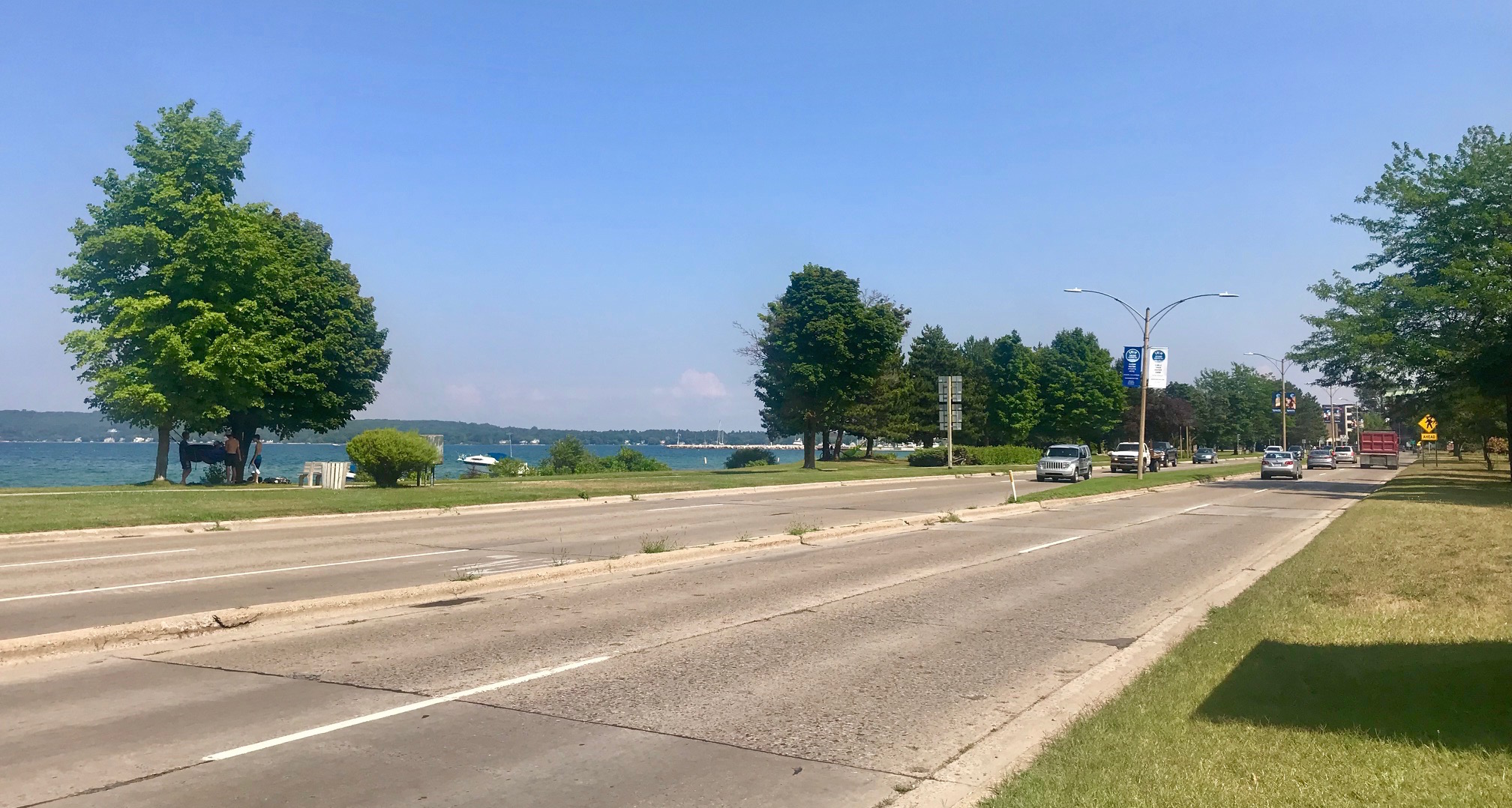 Grandview Parkway
Grandview ParkwayFor years, the Michigan Department of Transportation (MDOT) has been sketching out plans to invest some $27 million in revamping the parkway, from 500 feet west of Division Street and running east to the north side of the M-37/Garfield Road intersection. Over the course of 2024, MDOT will rebuild that entire two-mile stretch of highway, including asphalt, curb and gutter, sidewalk, drainage and repairs to Murchie Bridge. The project will also redesign several intersections along the route to incorporate more crossings and other pedestrian or cyclist-friendly features.
MDOT has already commenced work on certain parts of the project, including the installation of temporary traffic signals at three key intersections – Railroad/East Front, Railroad/Washington, and East Front/Milliken – to prepare for traffic detours. But the majority of the work will begin in the spring, with MDOT set to break the project up into two segments: an eastern segment from Garfield Avenue to Front Street; and a western segment from Front Street to Division Street.
Work on the eastern segment is “anticipated to begin in March,” according to the city, and is slated to be finished in time for the National Cherry Festival in July. During construction, westbound traffic will be detoured onto Railroad Avenue and Eighth Street.
Crews will resume work on the parkway after Cherry Festival wraps, with the western segment demanding lane closures and traffic shifts for both directions of traffic. Work on the second segment is expected to last until November.
Given that Grandview Parkway is arguably the key east-west thoroughfare in Traverse City – as well as the gateway between Grand Traverse and Leelanau counties – the construction project is expected to have significant impact on local traffic flows, commute times and overall mobility. The question is how far those impacts will reach – and what the consequences might be for businesses, schools, events and more.
“The Parkway will be a big project, but I think our region is prepared to work through it,” said Traverse Connect President and CEO Warren Call when asked to predict any potential economic fallout from the project. “There has been a lot of thoughtful planning and preparation, and I believe the Traverse City Downtown Development Authority (DDA), BATA, and Traverse City Tourism (TCT) will be putting out joint communications, transportation info, and wayfinding to help visitors get around.”
Communication is key to the project, says TCT President and CEO Trevor Tkach.
“We as institutions – TCT, the City of Traverse City, the DDA, Traverse Connect, BATA, and TART Trails – are going to be doing continuous communication on this issue, so that we know where we are in the project at all times and how to explain the detours and options for locals and visitors alike,” he said.
While Tkach says he doesn’t expect the Parkway closure will depress travel trends in northern Michigan, he does think certain hotels, businesses, or events could prove more frustrating for visitors to get to than usual.
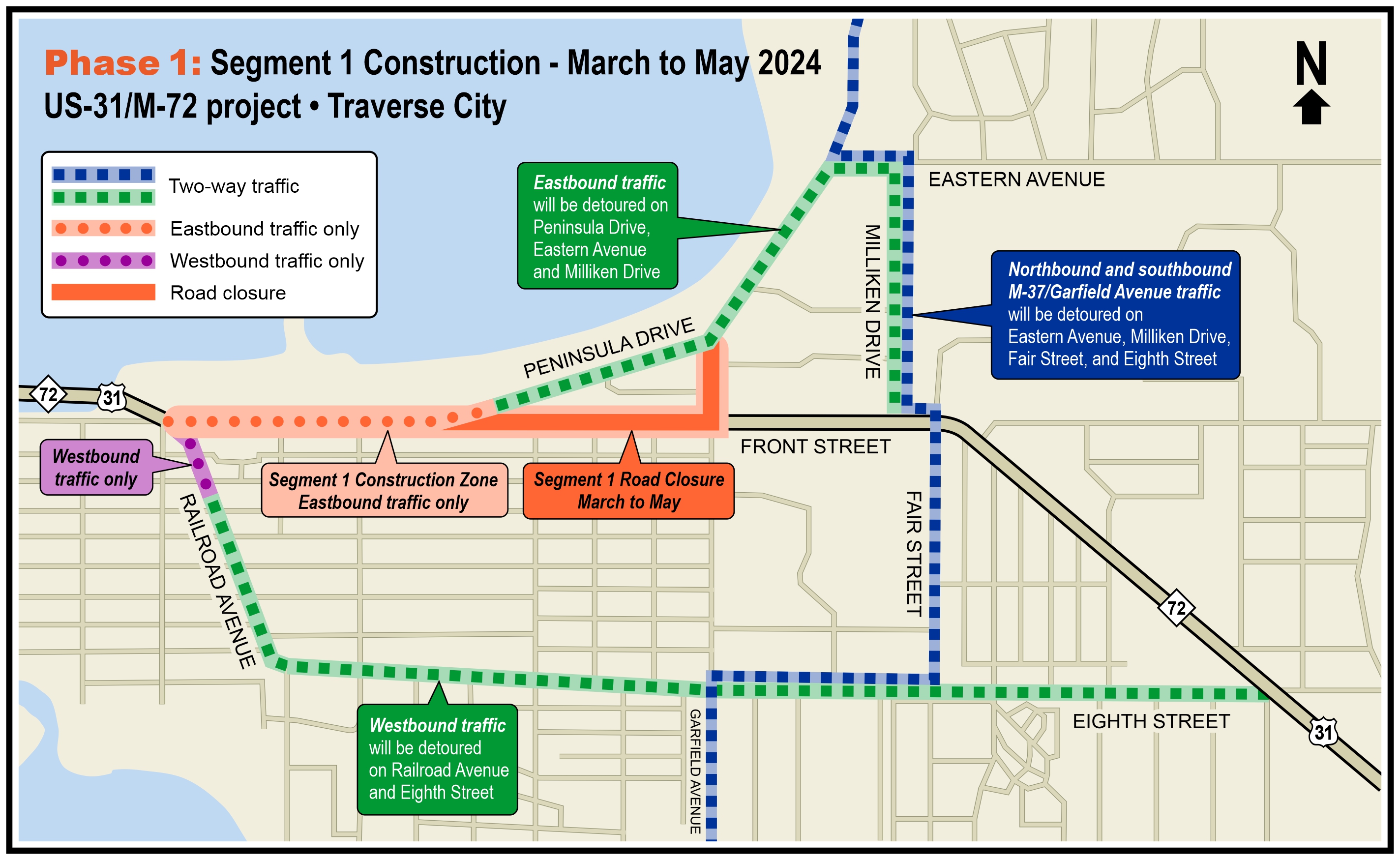 A detour map for the first phase of the Grandview Parkway project.
A detour map for the first phase of the Grandview Parkway project.“What I’m more concerned about (than people not coming here) is their behavior once they get into market,” Tkach said. “I do have concerns for our downtown businesses. We have a lot of hotels on the east side, and it’s going to be very difficult for visitors – and locals! – on that side of town to get downtown for a long time.”
Tkach also points to the Bayshore Marathon – which starts and ends near Central High School on Memorial Day weekend – as an example of a major high-traffic event that could prove to be more logistically challenging than usual due to the road closures and detours.
In general, Central High School will likely be one of the toughest local landmarks to access. When asked how Traverse City Area Public Schools (TCAPS) is plotting its transportation strategy, Christine Thomas-Hill – the district’s assistant superintendent of finance and operations – zeroes in on Central immediately.
“Central High School will definitely have the biggest impact of all our schools,” Thomas-Hill said, noting that detoured traffic and a temporary light at the Milliken/East Front intersection will almost certainly impact traffic flows to and from the school. “It’s going to be a congested travel area, so we’ll do the best we can to re-time those buses so they can get to school on time. We’ll also do some communication directly to our parents and our student drivers at Central to make sure they understand what’s coming and how best to use the detours.”
Speaking of buses, BATA Communications Director Eric Lingaur says the organization is hard at work on a modified transit plan that will allow everyone to get where they are going on time.
“BATA is going to focus on helping people navigate the construction and avoid being stuck in traffic by modifying its free, high-frequency Bayline route and encouraging people to use park-and-ride locations along the route,” Lingaur said. “BATA will be partnering with the DDA on a promotional campaign to educate residents and visitors on public transit options to access downtown during the construction.”
Lingaur also notes that BATA will “be opening its new LaFranier Road Transfer area” – which includes a 40-spot park-and-ride lot – in May, which he says “will provide another way for people to easily get downtown.” Construction on the headquarters is slated to finish out in July or August.
For his part, Call says he is also hopeful that locals take advantage of BATA park-and-rides or other similar opportunities to get their cars off the road and to minimize overall traffic around town.
“I see this project as an opportunity to highlight the walkable, bikeable, and public transport infrastructure that we already have in place to support the economy,” he said.
Marijuana Shops
One of the big questions at the beginning of 2023 was what the City of Traverse City would look like once it finally issued its first retail licenses for adult-use marijuana. Heading into 2024, the question now is how many of those licensed retailers will still be standing come 2025.
 The Lume Cannabis shop in downtown Traverse City.
The Lume Cannabis shop in downtown Traverse City.Last March, the city licensed 16 locations within the city’s 8.6 square miles to sell adult-use marijuana. As of New Year’s Day 2024, 13 of those 16 locations are operating as functional dispensaries, while another – Dunegrass – is slated to open a store at 440 East Front St. early this year. The other two licensed operators – one at 314 Munson Ave. and one at 934 Hastings St. – have not yet announced opening plans, but could get up and running in 2024.
As Traverse City’s cannabis market matures and settles, local operators predict some degree of attrition among the city’s stores. Typically, Michigan communities that have opted in for recreational weed sales have seen an initial burst of demand followed by a drop-off. The market then stabilizes, with some shops finding enough regular customers to persist and others going out of business.
Speaking to TCBN sister publication The Ticker in October, Cloud Cannabis Founder John McLeod pointed to Gaylord as an example.
“(Gaylord) initially gave out more than 20 licenses,” McLeod said. “There have maybe been 10 stores that opened, and three of those have closed. So, it’s one of those things where the market will determine how many stores is the correct amount.”
Similarly, Justin Elias, president and founder of PUFF Cannabis, predicted that “20-25% (of Traverse City’s stores) will end up shutting down,” while Doug Hellyar – chief operating officer for Lume Cannabis Co. – estimated “a 25-30% reduction over the next two to three years.”
Despite the anticipated contraction of the local market, Traverse City dispensaries have seen an uptick in business since the city went from a medical-only market to a recreational cannabis scene. McLeod says that Cloud did four to five times the sales this past summer that it did during summer 2022. Elias, meanwhile, says PUFF was turning away 70-100 walk-ins daily during the medical-only days; now, the store can serve those customers.
Another marijuana-related development to watch this year: Traverse City’s first opportunity to share in tax revenues from recreational cannabis. Last year, municipalities in Michigan received $51,800 in tax revenues for each dispensary operating within their jurisdictions. A similar payout rate this year would put hundreds of thousands of dollars in the coffers for both the City of Traverse City and Grand Traverse County.
Indoor Sports Complexes
For years, a local group calling itself the Traverse Indoor Sports Coalition (TISC) has been investigating potential opportunities to bring new sports complexes to the Traverse City area. Heading into 2024, that possibility seems closer to reality than ever before.
 A map showing potential locations for the fieldhouses.
A map showing potential locations for the fieldhouses.In March 2023, The Ticker reported that TISC was in serious talks with TCAPS about partnering to build two new community fieldhouses at Central High School and West Senior High, respectively. That public-private partnership would open up the option of paying for the complexes through a combination of TCAPS bond funds and private donations. TCAPS would own and operate the facilities – and use them for school sports, as needed – but the fieldhouses would also be available for community use.
TISC – which includes a variety of government, nonprofit, and business partners – has been working since 2018 to get the idea of indoor sports complexes off the ground in Traverse City. Traverse City Tourism and Traverse Connect – both of which are a part of TISC – have also repeatedly touted the potential economic, tourism, and quality-of-life benefits such facilities. TCT President and CEO Trevor Tkach, for instance, has noted that the ability to host indoor sporting events in northern Michigan could help bolster Traverse City’s shoulder-season tourism months, thereby bringing more people to town and more money to local hotels, restaurants, and other businesses.
Speaking to The Ticker in October, Tkach said the TISC project looked to be on track, with “real" interest from TCAPS in seeing these types of venues come online. The TCAPS board, meanwhile, has been circling the idea of pursuing a new bond request as soon as the November 2024 election – a request that could include the fieldhouses. The last TCAPS bond campaign, a 2018 request that passed with a 68% margin in Grand Traverse County, raised $107 million for the district and helped pay for numerous improvements, including the brand-new Innovation & Manufacturing Centers currently under construction at both high schools.
If voters were to approve a fall 2024 TCAPS bond – and if the bond were to include the new fieldhouses – TISC has said a project groundbreaking could occur as soon as spring 2025, potentially making the fieldhouses available for community use by late 2025.
But nothing is set in stone just yet. TCAPS Superintendent John VanWagoner told the TCBN that the TCAPS board “has yet to decide if there will even be a bond, and has not identified (the fieldhouses) yet as a project within the pre-planning.”
Freshwater Research & Innovation Center
Within a few years, northern Michigan could be home to one of world’s leading blue economy hubs. 2023 was a crucial year in that push, and 2024 is on track to be even bigger.
The World Bank defines the term “blue economy” as “the sustainable use of ocean resources for economic growth, improved livelihoods, and jobs while preserving the health of ocean ecosystem.” But the blue economy can also extend to other coastal communities, including those ringing the Great Lakes.
 A rendering of the Freshwater Research & Innovation Center.
A rendering of the Freshwater Research & Innovation Center.The Traverse City Freshwater Research & Innovation Center – a collaboration between Discovery Center & Pier, 20Fathoms, Michigan Technological University, Northwestern Michigan College and Traverse Connect – will eventually put a multi-million-dollar blue economy headquarters on the shores of West Grand Traverse Bay. The goal is to establish the Grand Traverse region as a global hub for applied freshwater innovation, offering research, education, commercialization, new business incubation, and startup acceleration programs.
The Freshwater Research & Innovation Center made big gains in 2023, scoring both a $1.6 million grant from the federal government and a $15 million allocation in Michigan’s 2024 state budget. Project partners have shared plans to break ground on the first phase of the West Bay headquarters in December 2025 – if not earlier. The $15 million in state budget money is coming from the American Rescue Plan Act (ARPA), which means it must be allocated by the end of 2024 and spent by the end of 2026.
While much of the on-the-ground work on the Innovation Center won’t start for another year or two, 2024 will still be a crucial year for the project. Project partners still need to raise $11 million necessary to reach the $26 million price tag that’s been estimated for the first phase. That initial phase is projected to take 18 months and will include construction of a 35,000-square-foot building with research, lab, classroom, and business incubation space. A second phase could follow, though its uses, tenants, and timelines are still to be determined.
Even beyond the money side of things, Discovery Center & Pier CEO Matt McDonough has said that a lot of work needs to be done to get the project ready for groundbreaking.
“There’s environmental work, geotechnical work, demolition, engineering, architectural work,” McDonough told The Ticker in October. Watch for much of that legwork to occur in 2024.
One crucial step that needs to happen between now and the 2025 groundbreaking? The relocation of several nonprofit tenants that currently lease space at Discovery Center & Pier, including the Great Lakes Children’s Museum, Maritime Heritage Alliance, Inland Seas Education Association, and Traverse Area Community Sailing.
New Mental Health Resources
Discussions about a nationwide mental health crisis have been more than audible in northern Michigan for years. 2024 could change that conversation for the better, with several new mental health supports set to come online in northern Michigan.
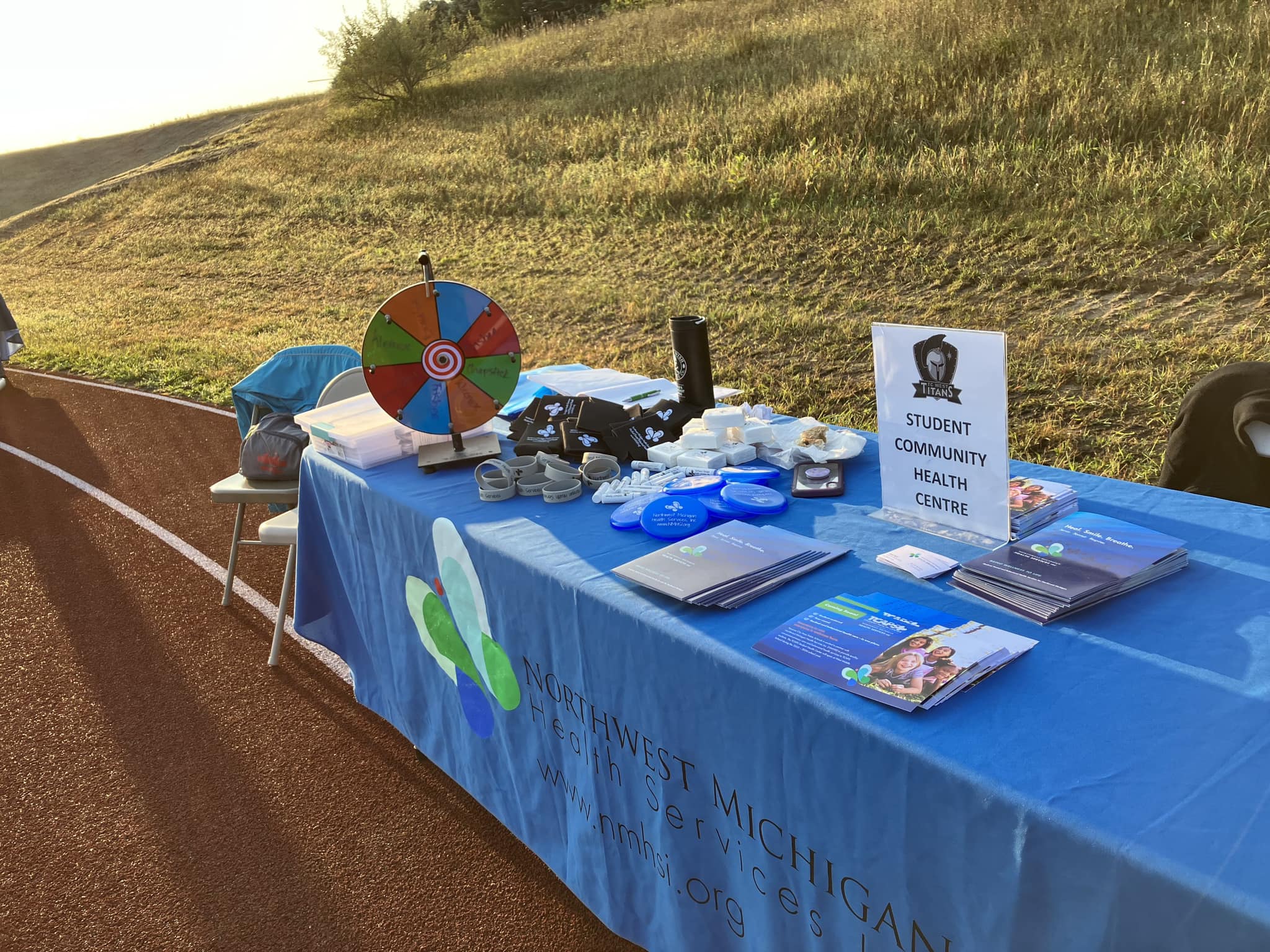 Northwest Michigan Health Services is partnering with TCAPS for a new on-campus student health center.
Northwest Michigan Health Services is partnering with TCAPS for a new on-campus student health center.Last fall, Traverse City Area Public Schools (TCAPS) announced plans to launch the TCAPS Child and Adolescent Health Center, a health clinic based on the campus at West Middle School and operated by Northwest Michigan Health Services Inc. (NMHSI). While that center offers both physical and mental health services to TCAPS students, Project Manager Nancy White sees the mental health component as the game-changer for the district.
“I can just tell that these are families that want behavioral health services,” White said. “It’s clear just from looking at the medications the students are on, or from the medical history notes families are including. These are not people who are looking for vaccines; they’re looking for mental health services. There is clearly a huge, huge need.”
In addition to the TCAPS center coming online, 2024 should also bring the opening of the Grand Traverse Center for Mental Wellness. That project is an ARPA-funded partnership between Northern Lakes Community Mental Health Authority (CMH), Munson Healthcare, Grand Traverse County, Northern Michigan Regional Entity (NMRE), Community Health Innovation Region, and United Way of Northwest Michigan and is intended to bring more mental health services and infrastructure to the region.
Per Munson, construction on the Grand Traverse Center for Mental Wellness will start in January, with “a projected opening for some services” occurring “by the end of 2024.” Those services will include a crisis hotline, mobile crisis services, referrals and scheduling for appointments, intervention services and more.
Later phases would add nursing and psychiatric assessments, as well as a crisis residential unit or stabilization unit with beds for youth and adults that require inpatient treatment.
The new center will be housed inside Munson’s 20,000 square-foot behavioral services building, located at 420 Brook St. Munson and its partners will renovate and convert the space to prepare for the new application.
ARPA Projects
In late 2022, Grand Traverse County commissioners took the county’s nearly $18.1 million in American Rescue Plan Act (ARPA) money and broke it into 30 different grants.
 Dozens of local ARPA-funded projects could move forward in 2024.
Dozens of local ARPA-funded projects could move forward in 2024.2023 saw the gears start moving on some local ARPA projects, many of which have already been reported about in the Traverse City Business News. In our October issue, for example, we paid a visit to the Legacy Aviation Learning Center, a new aircraft maintenance school on Aero Park Drive getting up and running thanks in part to a $500,000 ARPA allocation from the county. Since TCBN’s visit, Legacy Aviation has received its official air agency certificate from the Federal Aviation Administration and opened the application window for its first 12-month cohort.
2024 will be an even bigger year of forward momentum for local ARPA projects, due mostly to federal requirements. Congress has mandated that all ARPA funds be “obligated” to specific projects by December 2024 and spent by December 2026. That ticking clock will motivate ARPA grant recipients to get the wheels rolling on their projects sooner rather than later, which could mean significant progress this year.
The two biggest ARPA allocations to watch are the $5 million set aside for mental health services in the county and the $3 million that the county kept back for itself.
The mental health money will help pay for a new 24-hour behavioral health crisis center, discussed above. Munson will soon commence renovations on a space at 420 Brook Street to make way for the new center, which should open for some services by the end of 2024.
The $3 million kept back for county operations, meanwhile, was not specifically allocated for any one project when county commissioners set it aside at the end of 2021. Deciding how and where to spend that money will be one of the county commission’s top tasks this year.
Other recipients of big grants include the Traverse Bay Children’s Advocacy Center, Mt. Holiday, Goodwill Northern Michigan and Michael’s Place.
Terry Beia, Kingsley, and the Arcade
As one of the top real estate investors and developers for both downtown Traverse City and downtown Kingsley, Terry Beia is the man to ask if you want to know what either of those places might look like in 12-18 months.
 This year could see numerous shake-ups with high-profile commercial properties in Kingsley.
This year could see numerous shake-ups with high-profile commercial properties in Kingsley.Take Kingsley, where Beia’s Southtown Property Management controls roughly half the commercial property in the village. Per Beia, Kingsley’s ongoing revitalization continues to drive significant demand and positive momentum for Southtown’s portfolio, including rapid growth of several existing Southtown tenants that has them close to outgrowing their current digs.
“To allow for more patron seating and expanded menu options, one of our Kingsley tenants – A. Papano’s Pizza – is targeting a spring 2024 expansion into the neighboring space currently occupied by The Kingsley Dance Studio on Brownson Avenue downtown,” Beia said.
The dance studio, in turn, is moving into a newly renovated 1,800 square-foot building located at 100 Clark St. that has been vacant since 2017.
Beyond those two change-ups, Beia says Southtown’s Kingsley properties are fully leased at this time, though he does anticipate a vacancy in the coming months, as Pitter Patter Preschool will be relocating to a company-owned facility.
Pitter Patter’s move will put a prime 1,600 square-foot space back on the rental market in the heart of downtown on Brownson Avenue, Beia says, adding that Southtown is currently “trying to recruit a coffee shop for the building, which seems to be a missing piece to the Kingsley puzzle.”
2024 could also see the relocation of Kingsley Lumber, which is currently situated at 311 South Brownson Ave., right next to Brownson Memorial Park. That move, Beia says, has been in the works for quite some time, as the current Kingsley Lumber property is a desirable spot in a high-traffic area and could be repurposed to house something with more community engagement potential.
“It is my understanding that a viable location has been secured by the Kingsley Lumber ownership and that building plans are in the works,” Beia said. “No specific timetable has been established but some movement forward is expected in 2024.”
He says that a mixed-use plan for the 311 Brownson building – including residential and commercial redevelopment of the parcel – is in the "very" early stages of discussion.
In downtown Traverse City, meanwhile, the question for Beia is what will happen with the historic Arcade building. Back in 1998, that building became the first piece of downtown TC real estate that Beia’s company, Traverse City Development, ever bought. In 2022, he sold 50% of the asset to Cherry Republic owner Bob Sutherland and Cherry Republic CEO Todd Ciolek, who turned around and leased the space to Cherry Republic for a planned downtown relocation.
 The future of downtown Traverse City's iconic Arcade building remains somewhat up in the air.
The future of downtown Traverse City's iconic Arcade building remains somewhat up in the air.Despite signing a 10-year lease at The Arcade, Cherry Republic ultimately opted to stay put at its long-time Front Street location in the Whiting building, citing construction costs and other hurdles when it announced the news last February.
Initially, Sutherland teased alternate plans for the Arcade space, saying Cherry Republic would be bringing a new retail concept to the ground floor that would have "nothing to do with cherries.” That idea still seemed to be the plan in September, when Sutherland told The Ticker that “it has taken us awhile to get architect and builders and vision in line for the Arcade,” but that he expected to have “something to announce in a month.”
The announcement never materialized.
When asked about Cherry Republic’s plans, Beia confirmed that the company is still partnered with Traverse City Development in the ownership and management of the Arcade, but is no longer planning any kind of concept for the ground floor.
“It’s my understanding that they have scrapped any plan to occupy the space in any form or fashion,” he told the TCBN.
Instead, Beia says Traverse City Development and Cherry Republic are working together to explore subletting and redevelopment plans for the 16,000 square-foot building.
“(The Arcade), with the exception of the Flying Noodle, has been fully demoed and abated,” Beia said, with work scheduled to begin shortly on white box completion of the space. The current plan is to have two retail spaces available for lease on the first floor and five residential condos available for sale on the second floor.
“We are in negotiations with a prospective tenant for 3,500 square feet of the ground floor retail space at this time,” Beia added.
Beyond the Flying Noodle, the Arcade has been vacant since September 2022, when businesses that had previously called the building home – including Studio Anatomy/Eugene’s Record Co-op, 2nd Level Goods, Bayfront Scooters, Art & Soul Gallery, Yellow Umbrella Vintage, and Black Candle Tattoo – were required to vacate to make way for Cherry Republic.
The Future of TIF
The future of a major funding mechanism for downtown infrastructure and improvements is likely to be determined this year.
The Traverse City Downtown Development Authority (DDA) gets the majority of its funding from a tax increment financing (TIF). TIF is a state-authorized funding tool that “captures” taxes from local taxing jurisdictions (the city, county, Northwestern Michigan College and other entities that receive portions of property tax revenue) and uses it to fund downtown improvements.
The property tax generated within the district at the time of the TIF district’s formation is set as the “baseline”. As development occurs within the TIF District over time, the property values increase, generating additional tax revenue. That additional revenue (above the baseline) is what’s captured by the DDA.
TIF-97, the larger of the DDA’s two TIF plans, was approved in 1997 and is set to expire in 2027. The city commission as soon as April could vote to approve a new TIF plan, dubbed Moving Downtown Forward, that modifies certain attributes of TIF-97 based on community and stakeholder input. If and when the commission approves this new plan, it may be subject to a referendum vote by city residents who vigorously oppose any further use of TIF downtown.
The future of TIF in the city has big implications for all parties involved. Supporters say TIF is the only way to ensure that the tax burden of improvements to downtown – which is used by hundreds of thousands of non-city residents each year – doesn’t fall on city residents alone. Detractors say downtown is in good shape and that the DDA no longer deserves to siphon taxes away from various taxing jurisdictions, which could put the money to good use elsewhere.
NMC Eyes Benzie County
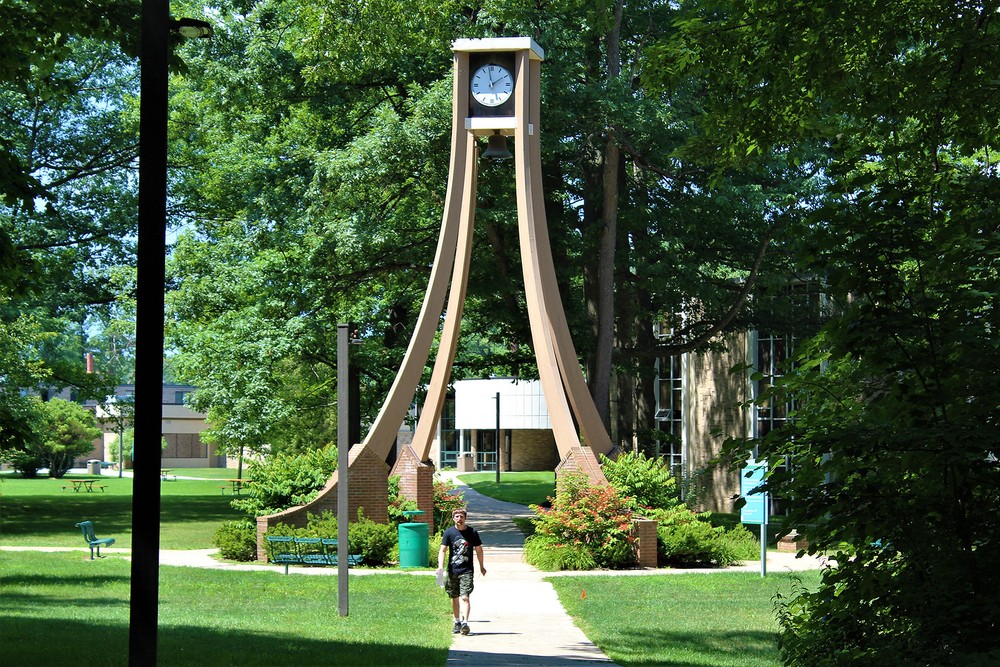
Northwestern Michigan College’s potential expansion into Benzie County could have big implications for both the college and thousands of Benzie residents looking to improve their lives.
While students from across the greater Grand Traverse region and beyond attend NMC, only Grand Traverse County residents get in-district rates. That’s because Grand Traverse County is the only county with a millage that supports college operations. The in-district rate is $122 a contact hour, while others pay $261.
Two citizen groups in Benzie want NMC to formally add their county to the district, a move that would require approval from NMC trustees along with a successful millage election in Benzie County. Nissley says the proposed millage there would be the same as in Grand Traverse County, which currently sits at 2.057 mills.
Nissley and the citizen groups – Advocates for Benzie County and BEST Benzie County (Building Educational Success and Training) – point to a large group of citizens in the county who stand to benefit. It’s estimated that 8,000 of Benzie’s residents – more than a third of the county's population – lack any form of post-high school training.
In addition to several associate’s degrees and a few bachelor's degrees, NMC offers a host of training and continuing education programs that could benefit Benzie County residents.
“There’s going to be ways for us to engage with Benzie that go beyond the traditional 18-year-old student leaving high school and coming to college,” NMC President Nick Nissley said. “What about those 8,000 adults who may want to upskill, and those employers that need them to upskill?"
NMC plans a series of listening sessions throughout the county in the fall and into the winter. Depending on what officials hear, NMC trustees could officially approve moving forward with the process in the spring, with a millage election set for late 2024.
Farming on the Brink

Agriculture is a tremendously important part of the Grand Traverse Region’s economy, culture and heritage. People have made a living off the land here for generations, and agricultural operations still employ thousands of people in direct and supporting roles.
But local farming is under tremendous stress due to a particularly volatile mix of threats. Between rising costs and shrinking profits, increased overseas competition (particularly for cherry farmers), a lack of interest from the next generation and increased pressure to sell for development, farms are falling like dominoes. The region’s agricultural future is at a tipping point.
The issue came into sharp focus last summer when an Acme Township man quit farming after his family had done so there for 150 years. He attracted national attention when he cut down his prominent orchard along US 31, generating discourse about the future of farming in a region long celebrated for it. The West Michigan Fruitbelt, which runs through our region, was identified by the American Farmland Trust as one of the 10 most threatened agricultural resources in the entire nation.
Those concerned about this worrisome trend this year and in the near future will continue to keep eyes on the organizations and people who have the best chance of slowing down the loss of farmland.
The Grand Traverse Regional Land Conservancy and Leelanau Conservancy continue to work to secure conservation easements on local farms. They’ve permanently protected thousands of acres of local farmland from development with these legal tools, which permanently restrict the way land can be used in perpetuity. Landowners must voluntarily agree to protect their land in this way, and often get tax benefits for doing so.
Another plan of attack comes from people like Nikki Rothwell and her team at Michigan State University’s Northwest Michigan Horticultural Research Center in the heart of Leelanau County. They’re focused on intensive research into new growing techniques and other innovations to help local farmers stay profitable.
Election 2024

Are you ready for round two?
There’s a lot that can happen between now and November, but plenty of prognosticators are predicting a rematch of the 2020 presidential election, with Joe Biden and Donald Trump trading incumbent and challenger roles. Many worry that such a rematch is likely to come in the form of another drawn-out, vitriol-filled slugfest that serves to divide the country even further along partisan and cultural lines.
And while that prospect is certainly unappetizing enough, experts are also keeping an eye on business-driven matters in the leadup to the election. For example, a recent survey by the Nationwide Retirement Institute showed that nearly half of investors believe the results of the 2024 U.S. federal (presidential and congressional) elections will have a bigger impact on their retirement plans and portfolios than market performance alone due to concerns about taxes, economic policy and other matters.
While history shows the economy has generally continued to grow over the last 100 years regardless of who is in the white house, experts say the economy and markets can take a temporary hit due to policy, particularly those that impact growth and inflation.
Businesses, particularly larger ones, are also readying themselves for another very high-profile election in the modern era and what it might mean for their reputation in the public sphere. This includes how to incentivize and/or facilitate their employees’ ability to vote, along with better tracking of corporate contributions to political causes in a time when organizational values, social responsibility and transparency are arguably more important than ever before.
Locally, it’s too soon to say for certain what will be on the ballot in November, but area voters will experience some changes. First is early in-person voting, which will allow voters to cast a ballot in person at many locations ahead of time. Also new is a permanent ballot list, in which a voter will automatically be sent an absentee ballot instead of having to submit an application every time.
Battle for Sutter Road

A battle is brewing in a scenic corner of Benzie County, where a proposal to relocate a road has some residents and visitors up in arms.
Last March, the prestigious Crystal Downs Country Club (located between Crystal Lake and Lake Michigan) presented the Benzie County Road Commission with a proposal to relocate a section of Sutter Road. The club says that moving the road will address various safety concerns and make the property contiguous (the road in its current location bisects the country club grounds). The old road would then be returned to a “natural state,” though what that means is not defined.
The club said it plans to fully fund the project at little or no cost to taxpayers, and points out that all construction, except for road connections and intersections, will take place on club-owned property.
“The goal is to improve safety for club employees, visitors and members, particularly at the club’s back entrance, at the maintenance facility near the driving range and the irrigation station,” a statement on the club’s website reads. “The project will also result in a safer commute for the community as well as an improved road which will be less costly for the Benzie County Road Commission to maintain.”
Not so fast, say plenty of residents upset with the proposal. “Save Sutter Road” lawn signs are common in the immediate area, and a website of the same name lists a variety of reasons to oppose the plan. Among them are the “loss of a beautiful stretch of road that many of us have enjoyed traveling along for decades,” the potential for increase runoff into Crystal Lake and the suggestion that the whole relocation is part of a plan to reconfigure and expand the driving range.
“The complete lack of credibility in the Downs’ reasons for supporting this proposal suggests an alternate agenda,” the website states in part.
Benzie County Road Commission Manager Troy Hinds tells the TCBN that his agency is in a holding pattern.
“We’re pretty neutral on everything until we see some formalized plans in front of us…and we can get them verified with our engineers,” Hinds said.
Regional Office Space Usage
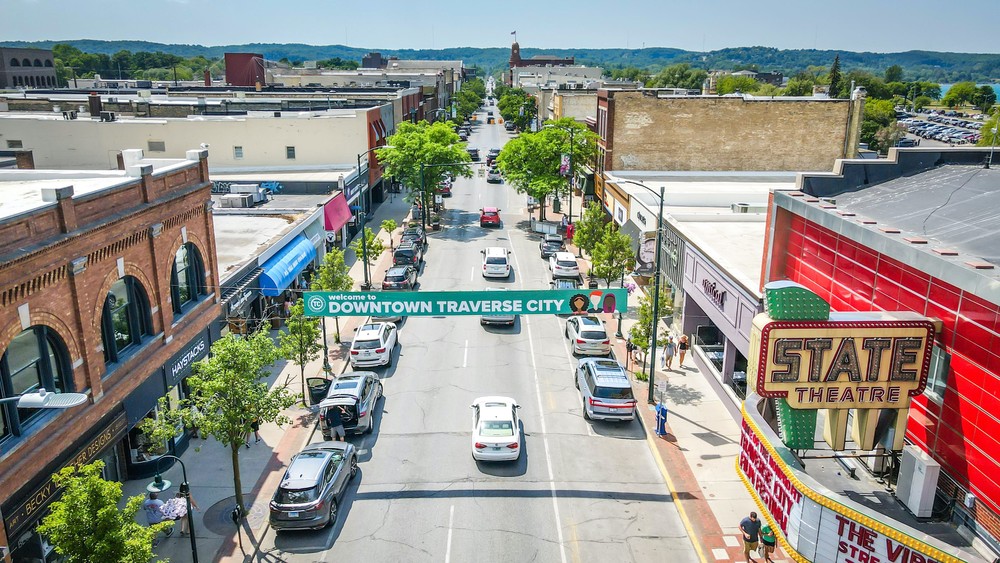
It’s always been said that downtown Traverse City is the hottest commercial (particularly office) real estate market north of Saginaw. And while that’s still likely true, COVID dropped an atomic bomb on the way companies interact with their employees. While many white-collar workers have returned to the office in the post-COVID world, it’s likely that remote work is here to stay – but in what capacity?
Local business and real estate leaders are keeping an eye on what 2024 will bring. Traverse Connect President and CEO Warren Call tells the TCBN he expects to see continued debate between the merits of in-person and remote work.
“Many employees (and some employers) will continue to want fully remote and hybrid work options, while many employers would like to have their teams fully back in the office,” he said. “I think the most likely outcome is a continued ‘modernization’ of work formats that is hybrid and flexible for the roles that allow it.”
That will mean that offices of the near future are likely to look and feel – and be used – different than what we’ve all been used to, Call said. Companies moving or opening here are already building flexibility into their spaces, he added.
“I think office space will be set up in a more flexible format with lounge-type areas and shared spaces, rather than offices and cubes,” Call said. “Prime office space will be adapted to reflect this more flexible format, while sub-quality office space will likely be redeveloped for other uses, including housing.”
Kevin Endres is the owner of Three West, a Traverse City-based commercial real estate agency. He said he’s seen most companies return to a largely full-time office presence, with some even purchasing buildings to own their own space instead of renting. The data, he said, shows that there is still plenty of interest in office space, and that’s likely to continue into 2024.
“In a 2022 to 2023 Q3 comparison, the price per square foot of office space went up considerably and the days on the market for office space dropped,” he said.
Another thing to keep an eye on is the lease market. Hagerty is downtown’s biggest tenant from a square footage standpoint (it sold its HQ buildings several years ago and now leases them, and until recently also rented several other prime spaces). In a statement provided to the TCBN, company officials said they are now a remote-first workplace, which has enabled their growth through (among other things) broader access to talent.
Altus Brands

Among the many local companies to keep an eye on in 2024 and beyond is Grawn-based Altus Brands. The company focuses products for the hunting and shooting marketplace, including various forms of passive and electronic ear protection that can be worn over or inside the ears.
Recently announced is a partnership between Altus and Denmark-based Earfab ApS, a joint venture called Earfab Americas that is expected to create nearly 100 new jobs here in Grand Traverse County. Earfab allows customers to order custom-fitted earplugs by using a smartphone app that creates a three-dimensional image of each ear.
“We’re really going to be the first mass-customized product…it’s actually pretty phenomenal,” Altus Brands CEO Gary Lemanski tells the TCBN. “We’re focused on any product that goes in the ear, from earbuds to hearing protection to hearing aides…instead of having a universal fit product, you’ll have something that is customized to fit your inner ear.”
The project is expected to generate a total capital investment of $2.74 million and create 93 jobs. It’s supported with a $575,000 performance-based grant from the Michigan Business Development Program. Northwest Michigan Works! has also pledged to offer up to $185,612 for workforce development and training support.
“This dynamic project will help expand the capabilities of this company and bolster the region with a robust workforce in the key sector of manufacturing,” the Michigan Economic Development Corporation said in a statement.
Altus already has the space, but will be investing heavily into getting it ready for Earfab production, which Lemanski said is expected to begin by spring.







